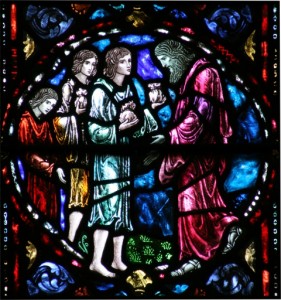First Reading: Judges 4:1-7
Our long trek through the ancestral stories of Israel draws near its end in the book of Judges. The people live in the promised land but don’t yet have a king. They have settled in to a cycle of behaving badly – “doing what was evil in the sight of the Lord” – then repenting, turning back, and restoring justice under a judge. Considering the patriarchal culture of the First Testament, it is quite remarkable that one of the most noteworthy judges was Deborah, a prophet and a woman, who with God’s help seems quite confident in ordering her generals into battle.
First Reading (Track 2): Zephaniah 1:7, 12-18
We have two more weeks until Advent, but our readings – reflecting an ancient tradition – don’t wait to turn toward Advent themes. Immediately after All Saints, we begin to hear alarming prophecies and puzzling parables about Judgement Day, waiting for Jesus, and the kingdom of God. The ancient reading from the prophet Zephaniah imagines a horrifying Judgement Day, when those who complacently and without humility ignored their duty to be righteous and just will reap what they sowed.
Psalm: Psalm 123
Subtly but sharply, today’s readings move from the female judge Deborah to a short, powerful Psalm of worship and praise that quite clearly looks to God in male and female imagery as both master and mistress. We can see inspiration for a theology of liberation here, too, in the Psalmist’s call for a preferential option for the poor, over against the contempt shown them by the rich and the proud.
Psalm (Track 2): Psalm 90:1-12
We are very small. God is very large. A thousand of our years pass in a moment for God, while our lives “pass away quickly and we are gone,” like grass that dries up in a day in the desert heat. The Psalmist – taken by tradition to be Moses, the only Psalm so attributed – petitions God on our behalf, praying that God may help us learn to make good use of the time that we are allotted.
Second Reading: 1 Thessalonians 5:1-11
In last week’s reading, Paul assured his church in Thessalonika that the Christians who had died before Christ’s return would not lose their opportunity to be with him in the kingdom. Now he urges them to be prepared. Using colorful metaphors – a thief in the night, and a woman’s sudden labor pains – he emphasizes that the day of the Lord may come suddenly and by surprise. Be faithful, he says; be loving; care for one another, and be ready.
Gospel: Matthew 25:14-30
It’s hard not to feel sorry for the third slave in today’s Gospel. Many of us would probably be just as cautious in safeguarding an angry master’s treasure. But look at what comes next in this series of parables about waiting for Christ’s return: The last judgement, when Christ will look for those who saw the face of Jesus in the hungry, the thirsty, the oppressed, sick persons and prisoners. Jesus hopes that we, like the first two slaves, will take risks and give of ourselves abundantly, that we may enter into the joy of our master.

